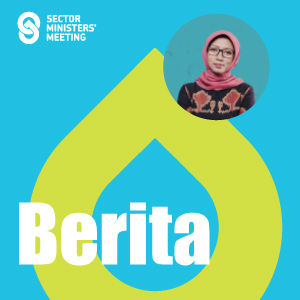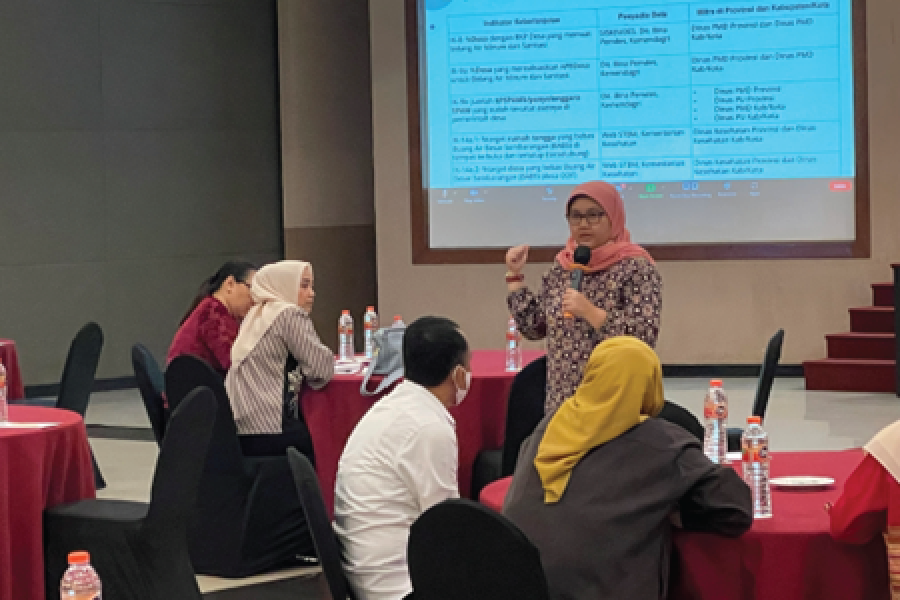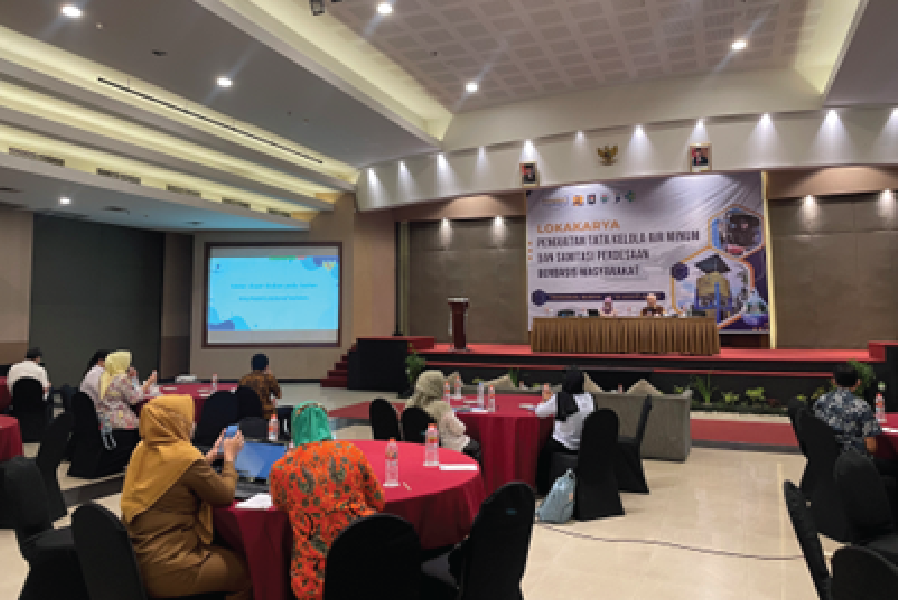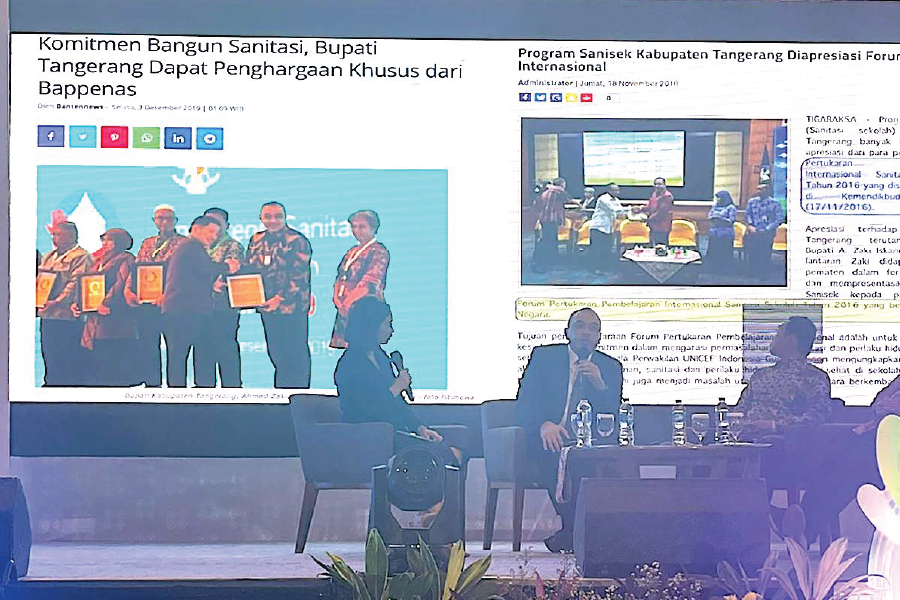As countries worldwide struggle to restore essential services in the wake of COVID-19, the 2022 Sector Ministers’ Meeting has reinvigorated Indonesia’s progress on water and sanitation, according to Tri Dewi Virgiyanti, Director General for Housing and Settlement, Ministry of National Development Planning (BAPPENAS).
Hosted in May 2022 by the Government of Indonesia in collaboration with SWA and UNICEF, the event welcomed over 350 participants and 57 government delegations. It was SWA’s first major in-person gathering since the COVID-19 pandemic, as well as its most ambitious to date, presenting a critical opportunity to link with other sectors as countries rebuild after a massive global shock.
SWA spoke with Virgiyanti about how her ministry leveraged the Sector Ministers’ Meeting to strengthen political will, as well as the country’s plans to achieve water and sanitation for all.
This interview has been edited for clarity and length.
What is the current state of water and sanitation in Indonesia, and how did hosting the Sector Ministers’ Meeting help catalyze progress in your sector?
In some areas of Indonesia, water and sanitation services are still inaccessible. In 2020, less than 12 per cent of households had safely managed drinking water, and a mere 7 per cent of households had access to safely managed sanitation. These numbers are far behind the targets we set for 2024 in our National Mid-Term Development Plan and the 2030 Sustainable Development Goals.
Government leaders are responsible to set progressive annual targets for local governments, which are feasible to achieve. The efforts on the national level are not yet sufficient, so learning from other countries is imperative.
As a member of SWA’s global partnership, we are actively engaging other ministers from around the world, which is helping us to keep up with new information. Hosting the Sector Ministers’ Meeting was obviously a big challenge for us, yet an equally big opportunity for Indonesia to strengthen political will on water & sanitation. It also allowed us to share best practices and initiatives that have been implemented throughout the years.
Vision 2045 aims to make Indonesia one of the world’s top five economies over the next two decades. What challenges are you currently facing?
Indonesia continues to face large human capital and infrastructure gaps, which impede its competitiveness and ability to create jobs and reduce poverty in the medium term. This has only been further complicated by COVID-19.
According to the World Economic Forum’s Global Competitiveness Index, Indonesia was ranked 50 out of 141 countries in 2019. [An updated index which shows the aftermath of the pandemic has not yet been published.] Between 2019 to 2020, both the human capital and infrastructure indexes decreased. This was partially due to cuts to public infrastructure spending to accommodate COVID-19 pandemic response. However, these gaps have also been worsened by the uncertainty of water and sanitation policies as well as their implementation.
What was the previous attitude toward water and sanitation in Indonesia before the Sector Ministers’ Meeting? How did you use this event to mobilize more political will in the sector?
The Sector Ministers’ Meeting took Indonesia’s water and sanitation sector to a new level. Before, we mainly worked with local governments and development partners. Now we have more chances to engage at the ministerial level and with key decision-makers. For example, the presence of the Vice President of Indonesia at the opening ceremony provided a lot more exposure and opportunities to position water and sanitation politically. Because this year’s event had a climate resilience and health focus, we also engaged with the Ministries of Environment and Health.
What was the most exciting part of hosting the Sector Ministers’ Meeting?
The preparation period was an indelible experience. Our government and development partners worked on logistics, and we had incredible collaboration with our SWA counterparts. Many participants have reported that they are using the outcomes of this event to advocate the prioritization of water and sanitation to their own governments.
What insights did you gain from the speakers and panel discussions at the event?
First, strong collaboration is key to raising the profile of the water, sanitation and hygiene sector. This also means engaging ministries and institutions outside of our sector, since water and sanitation are basic human rights. Additionally, pooling resources from different actors can potentially eliminate the access gap.
Second, we need quality data collection in order to properly allocate resources to the areas that need the most support. And this data needs to be accessible to ensure accountability and transparency and strengthen regulation of services.
Finally, government leaders need to ensure that our communities are aware that access to water, sanitation and hygiene services are essential, and create demand for them.
How can the water and sanitation sector improve advocacy going forward?
There are only a few Asian countries currently listed as SWA partners. However, being a part of the same platform eases the process of working together. Now is the time to reintroduce them to SWA and the benefits of joining high-level meetings like the Sector Ministers’ Meeting.
Additionally, the water and sanitation sector needs more attention and commitment from high level decision-makers. Advocacy between heads of state is imperative.
What are your next steps on water and sanitation in Indonesia?
With SWA’s support, we are hoping to continue our collaboration with the Ministry of Public Works and Housing, especially when it comes to the implementation of water and sanitation goals.
Furthermore, we are committed to strengthening SWA’s Mutual Accountability Mechanism (MAM) system which helps us sustain transparency and accountability among all of our stakeholders. We hope the MAM will encourage local governments to accelerate water, sanitation and hygiene services in their communities.
Finally, we are also hoping that there will be strong advocacy or a President’s directive to help us achieve our water, sanitation and hygiene targets in Indonesia.




